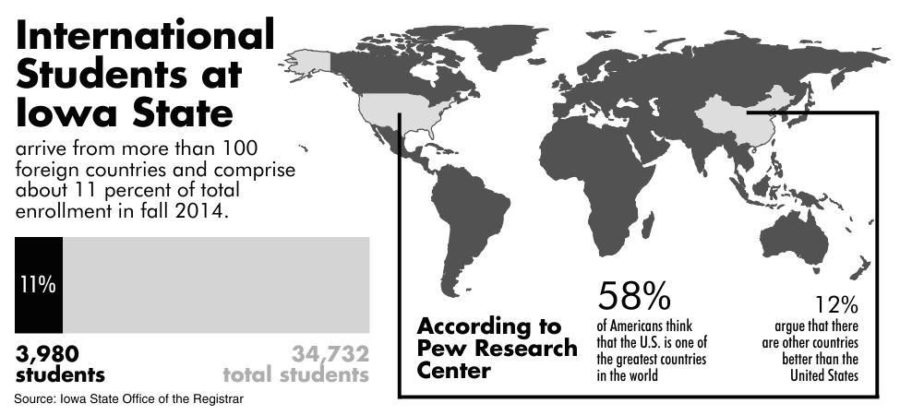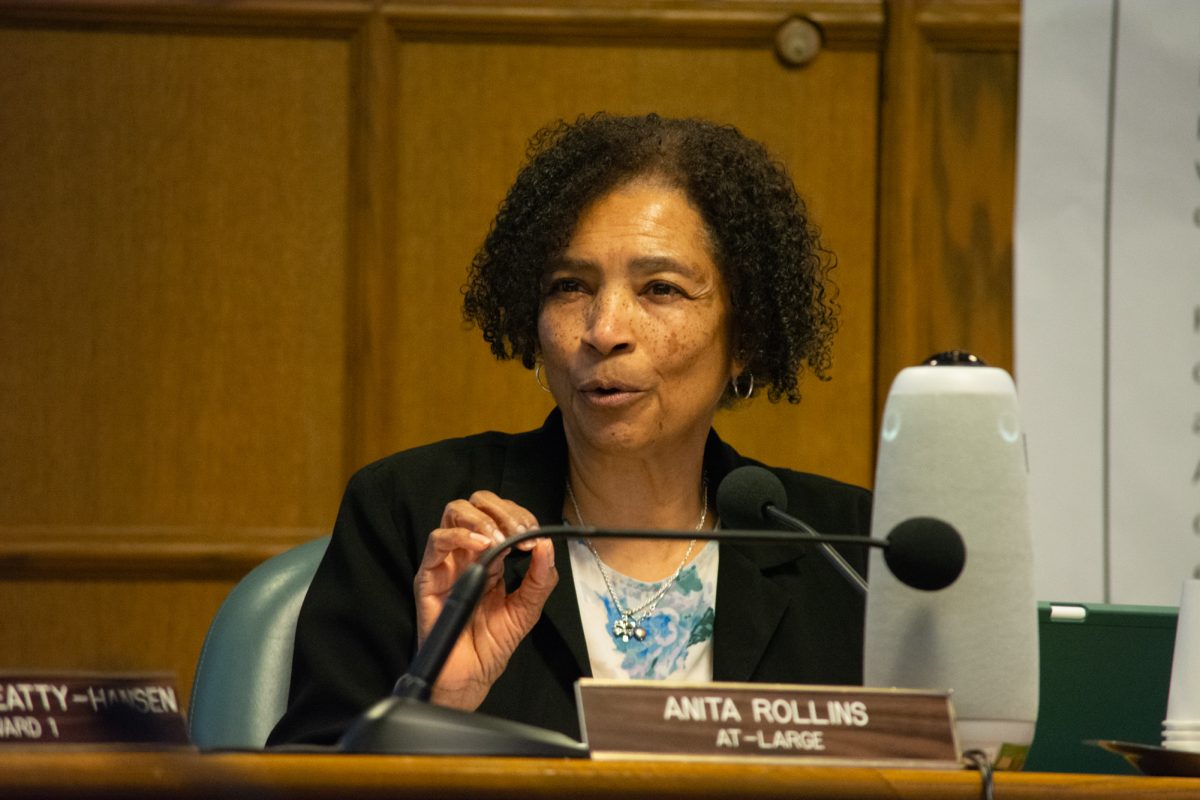Abalu: Put more thought into questions for international students
Infographic: Richard Martinez/Iowa State Daily
Of the 34,732 students at Iowa State, 11 percent are international students.
February 2, 2015
I have heard time after time that there are no stupid questions. This is true to an extent, especially if people genuinely do not know the answers to the questions they ask. However, I believe there are different ways to ask seemingly smarter questions.
In my own experience, moving from Nigeria to the United States was a change, but not that difficult. I was already familiar with U.S. culture through its representation in music, art, film and the media. My siblings also lived in the U.S. before I did, so I heard about what to expect and what it is like living there.
My sister told me how someone asked her how she got to the U.S. My sister sarcastically told the person that she swam here because she thought it was obvious that people knew flying was the most logical means of travel in this context.
The person also asked if there were cars in Africa and if people lived in trees. I found this so hilarious, but little did I know that I would experience something similar.
When I arrived at the JFK airport in New York in August 2013, the customs worker held my passport and asked, “are you from Africa?” I was puzzled because my passport clearly stated that I am Nigerian. Imagine asking an American, “are you from North America?” That sounds strange. People do not typically claim to be from a continent. Technically, I am from Africa but it is normal to identify as being from a country, state or city.
Nonetheless, I looked at the lady for a while and finally said, “yes, I am from Nigeria.” She looked at me, looked back at my passport, and then looked at me again. She finally said, “you’re not really Nigerian are you? Your skin is so light.”
I did not know what else to say at this point because all evidence pointed to the fact that I was indeed Nigerian. I was getting a little frustrated but I still assured her that I was Nigerian and not everyone in Nigeria had to be dark skinned to qualify as a citizen.
During the first semester of my freshman year, an American student asked me if there were trees in Africa. I had heard this question asked in movies, so I thought she was joking at first and I laughed. I then looked back and her expression told me that she was actually serious and the question was not a joke. I considered giving her a lecture about the dynamics of photosynthesis, but I finally responded by confirming that there were trees in Africa. Although I was shocked by the question, I did not think too much of it.
A common question people ask me is, “what’s it like in Africa?” There are over 50 countries in Africa, so I don’t know how they would assume I knew about all of them. Some even tell me that they know someone from Botswana or South Africa. That had nothing to do with me being from Nigeria. It’s like telling an American, “I know someone from Canada.” They might not be able to relate to that information.
One time on the CyRide bus, I was talking to one of my friends who was sitting beside me. A lady sitting opposite of me smiled and asked me where I was from. I told her I was Nigerian. She then said, “you speak English so well. Do they speak it in Nigeria?” I found this amusing but I explained to her that English is the first language in Nigeria due to colonization, although there are over 250 other languages.
On another occasion in my French class last semester, we had to do an interactive activity to get to know our classmates. A gentleman asked me what my name was and I said Omo. He said, “oh yeah, you’re the only one in class with a weird name.” I stared at him wondering how and why he just said that to me. I knew he intended no harm but there could have been a better way to say that. What if I told him that his name was weird? I wonder how he would have taken that.
The gentleman went further and asked where I was from. I told him I was Nigerian. He then asked if I have been in the U.S. for awhile but I said I just got here last year. He looked surprised as he said, “wow, your English is so good. I just assumed you would have been here for a while, you know.” No, I did not know I had to be American to be able to speak good English. It felt a bit belittling to me. My understanding is that the English language originated from England.
Christopher Santillan is a senior in aerospace engineering. He was born in California but grew up in Mexico. Santillan said people used to ask him where he was from and when he answered “California,” they would ask him again, “no, where are you really from?” Because of that, he stopped identifying himself as an American and identifies as Mexican instead. He also said when people ask him for his name and he says Chris, they respond, “but that isn’t Mexican.”
“Multicultural students knowing about American society and understanding that we need to appreciate cultural differences is a step that Americans need to take in reverse, so that they can start asking the right questions,” Santillan said.
I have had so many experiences and encounters like these that have led me to conclude that many Americans tend to ask foreigners the wrong questions.
A July 2014 report from Pew Research Center says that about 3 in 10 Americans think that the U.S. is the most superior country in the world, while 58 percent say it is one of the greatest countries in the world along with others and 12 percent say there are other countries that are better than the U.S. In most of my conversations with some Americans, I could sense that they may feel America is superior in the world and this may contribute to them asking multicultural people the wrong questions.
I am always glad to satisfy people’s curiosity, but I believe there are ways to ask intelligent questions that do not seem offensive in most cases. Technology also comes in handy and Google is an effective tool.
Based on my encounters, these are how the questions I have been asked should be rephrased:
First, “where are you from?” — Do not ask if a person is from a continent unless you really do not know where their country is in the world.
Second, you could ask, “is there a vast difference among ethnic groups in your country?” This is a better alternative than telling me I cannot be Nigerian because I am light skinned.
Third, ask “what languages do you speak in Nigeria?” — I know English might not be the first language in many countries, but it is better to ask this than to question why someone from another country speaks good English.
Fourth, instead of asking what it is like in Africa, ask, “What is it like in Nigeria?” Specify the country, not the continent.
And finally, I know “Lion King” and “Tarzan” were great movies but do not assume everywhere in Africa is a jungle. I do not know how exactly to rephrase the question of whether I “keep lions as pets,” but I live in a city and I can assure you that I have never seen a lion before.
My experience may not be the same as all international students, but one fact remains clear: it is important to familiarize yourself with the dynamics of diversity. Many learning tools exist to help you, not the least of which come from the Internet. Iowa State University is home to so many people from across the world.
Learning about those different cultures expands your perspective and you get to see the world from a different set of eyes. You will then be able to appreciate the beauty that is diversity.







